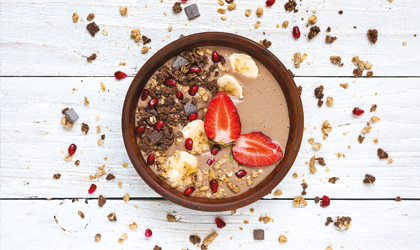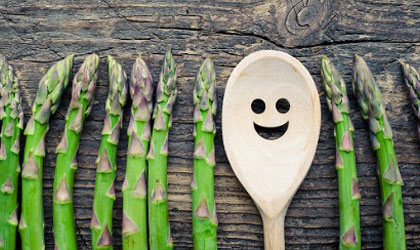
Once seen as alternative, the power of plants has now fully entered the mainstream. According to The Vegan Society, the number of people dabbling in a plant-based diet is higher than ever, with plant enthusiasts quadrupling between 2014 and 2018.i The reasons behind the plant boom are manifold: delicious plant-filled recipes have taken the internet by storm; top athletes are banging the drum for plant-powered diets, proving that vegetables can indeed make you fit and strong; scientific data continues to highlight the extraordinary health benefits of plants; and documentaries have revealed the alarming realities of agriculture on the environment and animal welfare.
With plant-forward choices steadily trickling into the high streets and diets across the world, we think it calls for a deep dive into plant-based nutrition, in all its colourful glory.
Plant-centred eating patterns can assume several guises. For some people, this dietary preference doesn’t eliminate meat or dairy entirely; rather it proportionately favours foods from plant sources. For this brochure, however, we define plant-based nutrition as eating foods that derive exclusively from plants, like vegetables, fruits, pulses, grains, legumes, nuts, and seeds. In other words: a diet that avoids all animal-based products, including dairy, eggs and gelatin.
Plant-powered foods
-
Vegetables: spinach, kale, cauliflower, squash, tomatoes
-
Whole grains: quinoa, barley, oats, brown rice, amaranth
-
Legumes: lentils, chickpeas, beans, peas, peanuts, alfalfa
-
Fruits: raspberries, strawberries, blueberries, bananas
-
Plant-based protein: tempeh, tofu, Edamame, quinoa
-
Healthy fats: avocados, nuts, seeds, chia seeds
-
Nuts and nut butter: peanuts, almonds, cashews
-
Seeds: chia, sesame, pumpkin, sunflower, flaxseed
-
Plant-based oils: olive, avocado, coconut, grapeseed
-
Plant-based milk: oat, hemp, hazelnut, soy, coconut
-
Spices and herbs: turmeric, ginger, cumin, coriander
Plant-based nutrition 101: what can I eat?
Following a plant-powered diet doesn’t always mean guzzling smoothies, munching avocado toast, or slurping up lentils. Technically, you can still adhere to the principles of plant-rich living if your diet consists of processed and packaged foods, like unhealthy ready meals, dairy-free ice cream, and ultra-refined faux meats. Unsurprisingly, we don’t advocate this. At its core, the plant-forward eating movement is varied, colourful, and abundant. It’s a diet that celebrates real, whole foods in as close to their natural, plant state as possible. Needless to say meatless nuggets are few and far between.
A day in the life of a plant-enthusiast…
Breakfast: coconut milk porridge with sliced banana, berries, and chia seeds
Lunch: quinoa salad with fresh vegetables, roasted chickpeas, and a tahini dressing
Snacks: dates with peanut butter and carrot sticks with hummus
Dinner: black bean stew with brown rice, sliced avocado, and coriander
Did you know?
You should aim to eat 30 different plant foods each week on a plant-based diet
What about organic?
Naturally, plant-powered eating should consist of, well, plants. Each year, the UK Government examines a range of produce for pesticide residue. Collating data over five years, they have created the following list of the ‘dirtiest’ and ‘cleanest’ fruits and vegetables. With this in mind, you may want to prioritise buying organic produce if it falls on the ‘dirty dozen’ list.
Dirty dozen
-
Grapefruit
-
Oranges
-
Lemons and limes
-
Strawberries
-
Pears
-
Grapes
-
Cherries
-
Peaches
-
Parsnips
-
Asparagus
-
Apples
-
Apricots
Clean fifteen
-
Beetroot
-
Mushrooms
-
Corn on the cob
-
Figs
-
Rhubarb
-
Swede
-
Turnip
-
Onions
-
Avocados
-
Cauliflower
-
Radish
-
Sweet potatoes
-
Broad beans
-
Leeks
-
Pumpkin and squash
What are the benefits of a plant-based diet?
Proponents of plant-based nutrition claim it has the power to halt, improve, and even reverse the top causes of death in the western world. But switching isn’t just advantageous for your health; it can also help transform the planet’s future – not to mention support animal welfare.
Mood food
A growing raft of scientific data proposes improved nutrition can support poor mental health, which is one of the biggest epidemics of our modern age. A systematic review in the Journal of Psychosomatic Medicine assessed 70,000 people and found significant improvements in the symptoms of anxiety when participants consumed fibre-filled foods – fruits, vegetables, whole grains, pulses, nuts, and seeds, which form the backbone of a plant-based diet – rather than processed foods and meat.ii
More fruit and veg, more nourishment
Increasing your intake of plant-based foods drives more antioxidants, fibre, potassium, magnesium, folate and vitamins A, C, E into your diet. These nutrients improve health in myriad ways, supporting immunity, digestion, cardiac function, gut micro biome, and skin health. A meta-analysis conducted by Imperial College London, in which 95 studies were examined, found that eating upwards of five portions of fruit and vegetables a day may cut the risk of dying prematurely by a third.iii Simply put: the more plant you pack into your diet, the more nourished your body will be.
Heart health
A plant-centred diet is also a potent weapon for cardiovascular health. The science for this is overwhelmingly convincing. Notable trials, including the work of Esselstyn (1980-present day), The Lifestyle Heart Trial (1990), and The Courage Trial (2007), all provide robust data to suggest plant-forward eating can significantly reduce blood pressure, cholesterol, and improve overall heart health.iv
Did you know?
Plant foods are crammed with phytonutrients – chemical compounds that plants use to stay healthy. These are the amazingly powerful nutrients that offer countless benefits to human health.
The Mount Abu Open Heart Trial (2011)v
In an open trial in India, researchers examined the effect of plant-based nutrition on 123 cardiac patients. Subjects on a wholefood diet saw an impressive 91% trend towards regression of plaque inside their heart vessels.
Did you know?
A person is admitted to hospital with a heart attack every 3 minutes, making it the number one cause of death in the UK.vi
Weight loss
A plant-based diet may also facilitate weight loss. Not only does plant-focused eating deliver a ton of satiating fibre – helping you stay fuller for longer – but it largely excludes unhealthy processed foods, too. This is a winning combination for weight loss. In one study, subjects following a plant-powered diet lost an impressive 4.2kg over 18-weeks.vii Furthermore, researchers purport that plant- enthusiasts are more likely to lose weight than their counterparts on a calorie-restricted diet, even when they have free reign over how much they ate.viii
Animal welfare
Beyond health and environmental benefits, some people are intrinsically motivated by plant-based living to support the welfare of animals.
Environmental implications
It’s hard to dispute the notion that adopting a plant-rich lifestyle is simply a more sustainable way to live. It can help reduce greenhouse gas emissions, water consumption, and land used for factory farming – all of which contribute to global warming. According to research from the University of Oxford, adopting a plant-centred diet is the ‘single biggest way’ humans can reduce their impact on the planet.ix
Did you know?
If the world went plant-based, food-related greenhouse gas emissions could be reduced by two thirds and avoid climate damages of a staggering $1.5 trillion.x
What are the limitations of a plant-based diet?
Does a plant-based diet sound too good to be true? Perhaps. even a diet of plants, in all its colourful glory, can have some drawbacks. If you’re considering swapping to plant-forward eating, it’s worth heeding the guidance outlined below.
Nutritional deficiencies
The biggest concern with a plant-based diet is the repercussions of eliminating main food groups. By cutting out animal-based products, like meat, fish, eggs and dairy, you run the risk of falling short in essential micronutrients – in particular, vitamin B12, iron, calcium, and omega 3 fatty acids. A deficiency in any one of these food groups may compromise your energy levels, bone health, cognition, and mood. If you’re following a plant-powered diet, therefore, you need to carefully plan your food choices and plug any nutritional gaps with supplementation. This aspect of plant-forward eating is something you need to prioritise and take seriously
‘Plant-based’ doesn’t always mean healthy
Not all plant-filled diets are created equal. Be especially watchful of foods marketed as ‘plant-based’. You may see this buzzword on a label and assume it’s teeming with health benefits. Don’t be fooled. Some plant products are shockingly unhealthy, containing excessive levels of sugar and sodium and highly processed ingredients. Frozen fake meats, veggie burgers, and tofu deli meats are some of the sneakiest culinary culprits that will hijack your health efforts. As with any packaged food, you need to become an ingredient sleuth when shopping for plant-powered foods.
Coconut yoghurt may be a delicious dairy-free alternative to satisfy your craving for a creamy je ne sais quoi, but it’s exceedingly high in saturated fat. Shockingly, this dairy-free treat delivers four times more saturated fat than full-cream dairy yoghurt!
Did you know?
You can find the highest amounts of vitamin B12 from animal-based sources, like meat, fish, and dairy. That’s why it’s critically important to supplement with a good quality Vitamin B12 supplement.
Impractical and inaccessible
For some people, plant-based nutrition can feel inaccessible and impractical, but you can take small steps to incorporate more plant based foods in your diet. Let’s not forget this dietary preference is still widely touted as being expensive and limiting when socialising or dining out. While this may only be true in part (nowadays, most restaurants can accommodate a plant-rich diet, and eating more whole grains, legumes, and beans generally cost far less than fish or meat), this commonly held belief about plant-powered eating persists, making the diet appear restrictive.
References:
-
The Vegan Society. (2019). Statistics. Available online: https://www.vegansociety.com/news/media/statistics
-
Firth. J., Marx. W. et al. (2019). The Effects of Dietary Improvement on Symptoms of Depression and Anxiety. Psychosomatic Medicine. 81(3), 265-280.
-
Wighton. K. & Angus. T. (2019). Eating more fruits and vegetables may prevent millions of premature deaths. Imperial News: Imperial College London. Available online: https://www.imperial.ac.uk/news/177778/eating-more-fruits-vegetables-prevent-millions
-
Esselstyn. C.B. (2017). A plant-based diet and coronary artery disease: a mandate for effective therapy. Journal of geriatric cardiology. 14(5), 317–320.
Wheatley. D. & Bass. C. (1991). Can Lifestyle Changes Reverse Coronary Heart Disease? The Lifestyle Heart Trial. British Journal of Psychiatry. 158(2), 264-267.
Boden. W.E., O'Rourke . R.A. & Teo . K.K. (2007). Optimal medical therapy with or without PCI for stable coronary disease. New Engl J Med. 356:1503–1516. -
Gupta. S., Sawhney. R., et al. (2011). Regression of coronary atherosclerosis through healthy lifestyle in coronary artery disease patients - Mount Abu Open Heart Trial. Indian Heart J. 63(5), 461-9
-
Bhf.org.uk. (2019). Facts and figures. Available online: https://www.bhf.org.uk/for-professionals/press-centre/facts-and-figures
-
Mishra. S., Xu. J., et al. (2013). A multicenter randomized controlled trial of a plant-based nutrition program to reduce body weight and cardiovascular risk in the corporate setting: the GEICO study. European Journal of Clinical Nutrition. 67(7), 718-724.
-
Barnard. N., Cohen. J., et al. (2006). A Low-Fat Vegan Diet Improves Glycemic Control and Cardiovascular Risk Factors in a Randomized Clinical Trial in Individuals With Type 2 Diabetes. Diabetes Care. 29(8), 1777-1783.
-
Carrington. D. (2019. Avoiding meat and dairy is ‘single biggest way’ to reduce your impact on Earth. The Guardian. Available online: https://www.theguardian.com/environment/2018/may/31/avoiding-meat-and-dairy-is-single-biggest-way-to-reduce-your-impact-on-earth
-
Springmann. M., Godfray. J., et al. (2016). Analysis and valuation of the health and climate change cobenefits of dietary change. Proceedings of the National Academy of Sciences. 113(15), 4146-4151.
You Might Also Like

Keri
Keri Filtness has worked in the Nutrition Industry for 19 years. She is regularly called upon for her professional comments on health and nutrition related news. Her opinions have been featured by BBC3, Prima, Vitality, The Mirror, Woman’s Own and Cycling Weekly, amongst others. She has also worked one to one with journalists, analysing their diets and health concerns and recommending changes and additions, where appropriate.
View More



